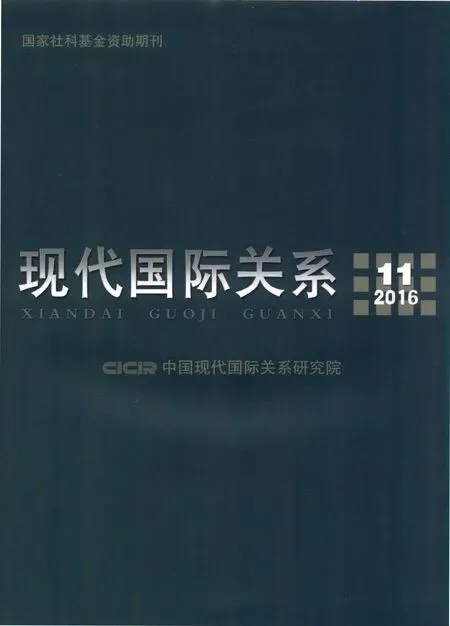Abstracts
s
Tense Situation in Korean Peninsula: Causes and Solutions
LiJun
Abstract: The denuclearization process in the Korean Peninsula began in the 1990s, aiming to persuade North Korea to abandon nuclear weapon development and rebuild security order in Northeast Asia. But it has achieved little success. The overall situation on the Korean Peninsula has deteriorated, especially since the beginning of 2016, confrontation has become prominent. Complexity of the situation and future uncertainty have increased suddenly due to profound historical background and interactions of the relevant countries. If unchecked, the possibility of another war on the Korean Peninsula cannot be excluded. To ease the situation, relevant countries should bear in mind the overall interests of peace and stability in Northeast Asia, exercise calmness and restraint.
Korean Peninsula, tense situation, causes, solution
An Analysis of Obama’s Middle East Policy
WangJin
Abstract: From the perspective of safeguarding U.S. national interests, Obama’s Middle East policy reduces further U.S. investment to the Middle East and American casualties, effectively promotes and coordinates the “Asia-Pacific Rebalancing” Strategy. So it is successful. From the perspective of the objective impacts of Obama’s Middle East policy to the region and the world, the policy is a failure. Two different conclusions reflect four main facts: the U.S. interests in the Middle East become narrower; the U.S. lacks the ability to control the Middle East; the interests of the U.S. and its allies become divided; the “introversion” of the U.S. diplomatic strategy is enhanced. The U.S. will continue to find a balance between preserving its own interests in the region and getting out of the region in good time.
Keywords: Obama, Middle East policy, US diplomacy
The Ambiguity of U.S. Freedom of Navigation Operation in the South China Sea and Its Implicit Logic
QiHao
Abstract: The Freedom of Navigation Operation (FONOP) has been a key catalyst since last October in escalating the Sino-U.S. disputes regarding the South China Sea. The FONOPs in the form of “innocent passage” ignited a heated debate within the U.S. Though the White House and U.S. military expect to deliver the promise on “Freedom of Navigation”, the practice in terms of low frequency and ambiguity failed their original intention. In spite of an award by the arbitral tribunal much in favor of the Philippines, a détente seems possible between China and other ASEAN claimants, which may get the U.S. involved in the South China Sea directly, mainly in the manner of upgraded FONOPs.
Keywords: South China Sea Dispute, Freedom of Navigation Operation (FONOP), innocent passage, the South China Sea arbitration
An Analysis of Sino-US Economic and Trade Relations in Obama Years
YuXiang:
Abstract: The second term of President Obama is winding down. Now there is very limited time and policy space left for Obama, the status of China-U.S. economic and trade relations is basically set. Generally speaking, the past eight years have seen nonstop progress of China and U.S. trade and economic ties. The interdependent and complementary economic and trade connections keep the most important bilateral relations developing and merging following their path dependence; the global challenges, such as financial crisis, extreme weather events, keep China and U.S. be in the same boat; decisions on important domestic policies and disputes could now be discussed effectively by the built multi-dimension crisis management mechanism. But there are unsettled and conflicting points in the relations, such as U.S. strategically excludes China from its free trade agenda, not ready to accept Common goods provided by China, which are obstacles preventing the relations’ deepening. In future, if both sides could have a big vision, the relations would develop better, the road for the “new type of major power relations” would be less rocky and bring more benefit for people of both countries.
Keywords: Obama Administration, Sino-US economic and trade relations, achievement, problems
Sino-US Political and Security Conflicts and Economic Interdependence
WeiNanzhi
Abstract Sino-US political, security and economic conflicts have been increasing along with the rise of China. The increasingly deepening Sino-US economic interdependence can ease but not resolve the political and security conflicts between these two countries. Nonetheless, Sino-US economic, political and security interests now intertexture the conflicts together because that China is climbing to the high end of global chain, China is changing to be a capital exporting country, the competition between Western multinational capital and China’s emerging capital is intensifying, as well as TPP and THAAD are becoming new forms of U.S. Rebalance strategy. Therefore, the relationship between China and USA is becoming more and more complicated and diversified, which as a result, requires both countries to effectively control the disputes and positively promote the cooperation under economic globalization. Today, to make pragmatic cooperation a “ballast” in China-US ties is important to address and resolve differences responsibly.
Key Words: economic interdependence, political conflict, security conflict, capital interests, Asia Rebalance
(Edited by Zhao Jinfu)

